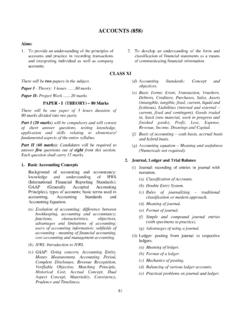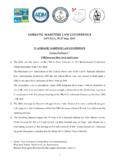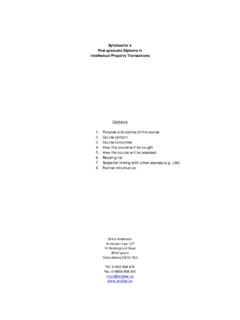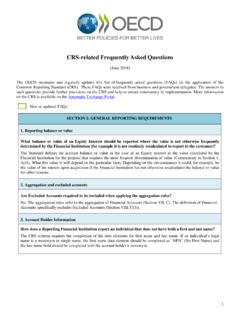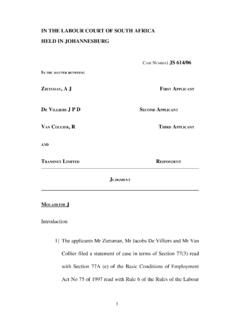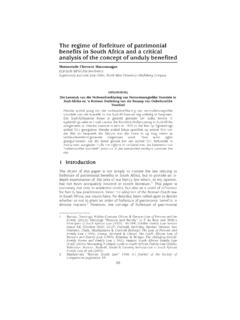Transcription of THE SUPREME COURT OF APPEAL OF SOUTH …
1 THE SUPREME COURT OF APPEAL . OF SOUTH AFRICA. CASE NO: 569/03. Reportable In the matter between HOLLARD LIFE ASSURANCE COMPANY LIMITED Appellant and G J VAN DER MERWE NO Respondent Before: Scott, Mthiyane, Conradie, Van Heerden JJA et Ponnan AJA. Heard: 19 November 2004. Delivered: 30 November 2004. Summary: Interpretation of exclusion clause in insurance policy . whether accidental, wholly self-inflicted injury falling within ambit of clause JUDGMENT. VAN HEERDEN JA. 2. [1] There were two main issues in the action giving rise to this APPEAL : firstly, the interpretation of an exclusion clause in an insurance policy and, secondly, the locus standi of the executor of an insured's deceased estate to claim benefits in terms of the policy in a situation where the insured had ceded all his rights under the policy to a third party as security for a debt owed by him to the cessionary.
2 [2] The appellant is Hollard Life Assurance Company Ltd ( Hollard'), the insurance company in question, while the respondent is the executor of the deceased estate of the insured, Jean Pierre van der Merwe ( the deceased'). [3] On 30 June 2001, the deceased concluded a written agreement of insurance ( the policy') with Hollard, whereby the latter undertook to pay the outstanding liability due by the deceased to Wesbank under an instalment sale agreement ( the credit agreement') in the event of, inter alia, the death of the deceased. The credit agreement between the deceased and Wesbank, relating to a motor vehicle, was concluded in early July 2001.
3 In terms of the policy the deceased ceded to Wesbank all [his]. rights, title and interest in and to this Policy as collateral security for the outstanding debt in terms of the Credit Agreement entered into by [him]. with the Credit Grantor [Wesbank]'. 3. [4] A few weeks after the conclusion of these agreements, the deceased accidentally shot himself with his own firearm and, in consequence, died. At the time of his death, he was still indebted to Wesbank under the credit agreement. [5] The respondent and Wesbank duly notified Hollard of a claim in terms of the policy, but Hollard rejected the claim, relying on an exclusion clause in the policy which reads as follows: 1.
4 EXCLUSIONS APPLICABLE TO DEATH, DISABILITY AND DREAD. DISEASE. No amount shall be payable if in our [Hollard's] Opinion:- . b) the claim is in any way due or traceable to, or arises directly or indirectly, entirely or partially from: . (ii) suicide, self-inflicted injury or self-inflicted illness, whether intended or not, or voluntary exposure to danger or obvious risk of injury.'. [6] When sued in the Pretoria High COURT for the benefits allegedly payable under the policy, Hollard pleaded that, as the cause of the deceased's death was self-inflicted injury', the abovementioned exclusion clause applied and the claim was thus not covered by the policy.
5 In addition, so it was alleged, as the deceased had ceded all his rights under 4. the policy to Wesbank, the respondent had no locus standi to enforce any claim against Hollard in terms thereof. [7] In the COURT below, the matter was approached on the basis of a stated case, the common cause facts simply being recorded prior to argument. Prinsloo AJ held that, notwithstanding the cession in securitatem debiti by the deceased to Wesbank, the respondent (as executor of the deceased's estate) could enforce the ceded rights against Hollard, despite the fact that the debt secured by the cession had not been extinguished.
6 With reference to the decision of this COURT in Leyds NO v Noord-Westelike Ko peratiewe Landboumaatskappy Bpk & andere, 1 the learned judge construed the cession as a pledge of the rights under the policy to Wesbank (the cessionary), the insured (the cedent) retaining ownership (dominium). in the ceded rights. By analogy with the rule' established in the case of National Bank of SOUTH Africa Ltd v Cohen's Trustee2 - namely that, on the insolvency of the cedent in securitatem debiti, the trustee of his or her insolvent estate is entitled to enforce the ceded right and administer the proceeds thereof as an asset in the insolvent estate, subject to the preferential right of the cessionary as pledgee Prinsloo AJ held that, on the death of the cedent (the insured), the executor of his deceased estate 1.
7 1985 (2) SA 769 (A) at 780A-H. 2. 1911 AD 235. 5. could enforce a claim under the policy against Hollard, subject to Wesbank's right to repayment of the amount still owing to it under the credit agreement. [8] Shortly before the commencement of the trial, the respondent took cession of any claim Wesbank may have had against Hollard under the policy and amended the particulars of claim accordingly. In a consequential amendment to its plea, Hollard alleged that any claim Wesbank may have had under the policy had prescribed by the time of the attempted cession, Wesbank not having complied with a provision in the policy requiring the institution of legal proceedings against Hollard within a specified period of time.
8 The COURT below rejected Hollard's allegations in this regard, construing the time bar provision in the policy as being applicable only to the insured. [9] As regards the reliance by Hollard on the abovementioned exclusion clause,3 Prinsloo AJ was of the view that the most reasonable and logical interpretation is that all the acts, namely suicide, self- inflicted injury, self-inflicted illness and voluntary exposure to harm presuppose the common element of deliberate intent.' On a strict interpretation', the phrase whether intended or not' in the exclusion clause 3. See para 5 above.
9 6. should apply only to the immediately preceding words, ie self-inflicted illness', and not to the words self-inflicted injury'. According to the learned judge- Bearing in mind the dictionary meaning of inflict and the fact that all the other actions in the exclusion clause presuppose intent, an interpretation that self-inflicted injury can be contrived without intent, would appear to be incongruous. If one then relies on the assistance of the contra proferentem and eiusdem generis constructions, such an interpretation becomes far-fetched and unacceptable. Quite apart from the question of interpretation the notion of excluding liability on the ground of self- inflicted injury which is not intended can lead to absurd results.
10 It would mean that the innocent insured who falls into an uncovered manhole at night and injures himself will not be protected by the policy. The same applies to the innocent insured who eats a contaminated can of sardines or drives into an invisible stationary object at night on the highway. In my view, such an interpretation will not be tolerated in the light of the principles referred to above.'. [10] The COURT concluded that the incident in which the deceased shot himself by accident and without intent or any other form of fault or unreasonable exposure to danger' did not fall within the ambit of the exclusion clause relied on by Hollard.










